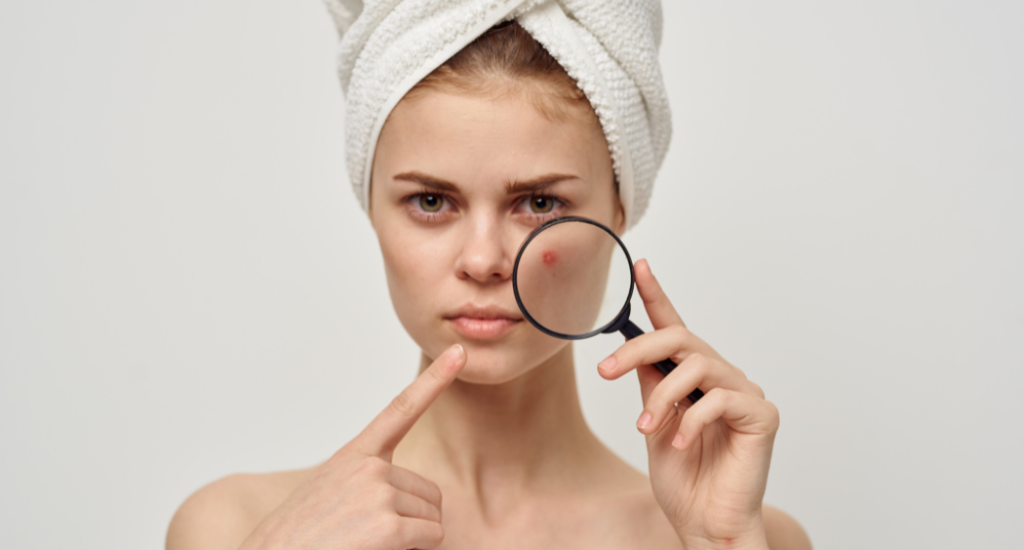The pursuit of clear and beautiful skin frequently leads us into a maze of skincare jargon. Acne and pimples are two phrases that commonly overlap in the confusing maze.
Are they the same, or are there subtle differences that distinguish them?
We uncover the secrets of these frequent skin conditions in this informative essay, revealing the various characteristics, causes, and treatments for acne and pimples. Prepare to go beyond the obvious and delve into the depths of dermatological knowledge.
By the end, you will have gained the knowledge to distinguish between bothersome pimples and formidable acne, empowering yourself with the power of informed skincare decisions.
What is Acne?
Acne is a chronic skin condition characterized by the presence of various types of lesions on the skin. These may include whiteheads, blackheads, papules, pustules, and even cystic acne.
Acne typically occurs when hair follicles become clogged with oil, dead skin cells, and bacteria, leading to inflammation and the formation of lesions.
Hormonal fluctuations, excessive sebum production, and genetics are among the common factors contributing to the development of acne. Acne breakouts commonly occur on the face, chest, and back.
What are Pimples?
Pimples, on the other hand, are a specific type of lesion that can be categorized as papules or pustules. Papules are small, raised, red bumps on the skin, while pustules are similar but contain pus at their tips.
Pimples are caused by the same factors as acne, such as clogged pores and bacterial infection. They tend to be smaller and less severe compared to other types of acne lesions. Pimples are often found on the face, particularly in the T-zone area.
Differentiating Acne from Pimples
To differentiate between acne and pimples, several factors need to be considered. The table below compares the two based on different aspects. Have a look!
| Aspect | Acne | Pimples |
| Types of Lesions | Whiteheads, blackheads, papules, pustules, cystic acne | Papules, pustules |
| Appearance and Severity | Larger, more inflamed lesions | Smaller, less severe lesions |
| Underlying Causes and Triggers | Hormonal fluctuations, excessive sebum production, genetics | Hormonal changes and fluctuations |
| Treatment Approaches | Combination of topical treatments, oral medications, lifestyle changes | Topical spot treatments, gentle skincare practices |
Misconceptions and Common Myths
There are several misconceptions surrounding acne and pimples. One common myth is that poor hygiene is the primary cause of these conditions.
In reality, acne and pimples are influenced by various factors, and maintaining good hygiene alone is not enough to prevent or treat them.
Additionally, there is a misconception that popping or squeezing pimples can help them heal faster. However, this can lead to further inflammation, scarring, and prolonged healing.
Importance of Seeking Professional Advice
While over-the-counter products can provide temporary relief, it is crucial to consult a dermatologist for accurate diagnosis and personalized treatment plans.
Dermatologists can assess the severity of the condition, identify underlying causes, and recommend appropriate medications or procedures to manage acne and pimples effectively. Seeking professional advice ensures proper care and reduces the risk of complications or long-term damage.
Prevention and Management Strategies
Prevention is always better than cure when it comes to acne and pimples. Adopting a consistent skincare routine that includes gentle cleansing, exfoliation, and moisturization can help keep the skin clean and balanced.
Avoiding excessive scrubbing or harsh products is essential to prevent irritation and inflammation. Lifestyle changes, such as maintaining a healthy diet, managing stress, and avoiding tobacco and excessive sun exposure, can also contribute to healthier skin.
Over-the-counter products, including cleansers, toners, and spot treatments containing ingredients like salicylic acid or benzoyl peroxide, can be useful for managing mild cases of acne and pimples. However, for more severe or persistent cases, prescription medications such as topical retinoids, antibiotics, or hormonal treatments may be necessary.
Know The Difference Between Acne & Pimples And Navigate The Path To Healthy Skin!

Understanding the difference between acne and pimples is vital for effective skincare and treatment. Acne is a chronic condition characterized by various types of lesions, while pimples are a specific type of lesion often associated with hormonal changes.
Seeking professional advice and adopting preventive measures can help manage these conditions and maintain healthy skin. Remember, clear skin not only boosts your confidence but also promotes a positive mindset and overall well-being.

